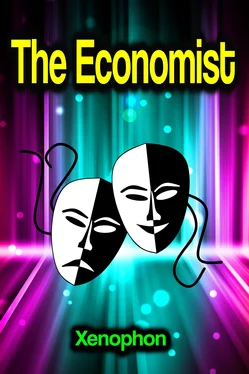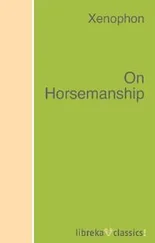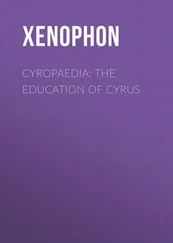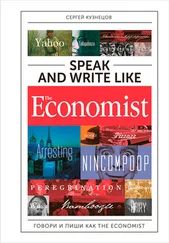Xenophon
The Economist
✓ VISIT OUR WEBSITE:
LyFreedom.com
Translation by H. G. Dakyns
Xenophon the Athenian was born 431 B.C. He was a
pupil of Socrates. He marched with the Spartans,
and was exiled from Athens. Sparta gave him land
and property in Scillus, where he lived for many
years before having to move once more, to settle
in Corinth. He died in 354 B.C.
The Economist records Socrates and Critobulus in
a talk about profitable estate management, and a
lengthy recollection by Socrates of Ischomachus'
discussion of the same topic.
PREPARER'S NOTE
This was typed from Dakyns' series, "The Works of Xenophon," a
four-volume set. The complete list of Xenophon's works (though
there is doubt about some of these) is:
Work Number of books
The Anabasis 7
The Hellenica 7
The Cyropaedia 8
The Memorabilia 4
The Symposium 1
The Economist 1
On Horsemanship 1
The Sportsman 1
The Cavalry General 1
The Apology 1
On Revenues 1
The Hiero 1
The Agesilaus 1
The Polity of the Athenians and the Lacedaemonians 2
Text in brackets "{}" is my transliteration of Greek text into
English using an Oxford English Dictionary alphabet table. The
diacritical marks have been lost.
THE ECONOMIST (1)
A Treatise on the Science of the Household in the form of a Dialogue
INTERLOCUTORS
Socrates and Critobulus
At Chapter VII. a prior discussion held between Socrates and Ischomachus is introduced: On the life of a "beautiful and good" man.
In these chapters (vii.-xxi.) Socrates is represented by the author as repeating for the benefit of Critobulus and the rest certain conversations which he had once held with the beautiful and good Ischomachus on the essentials of economy. It was a tete-a-tete discussion, and in the original Greek the remarks of the two speakers are denoted by such phrases as {ephe o 'Iskhomakhos—ephen egio}—"said (he) Ischomachus," "said I." (Socrates) To save the repetition of expressions tedious in English, I have, whenever it seemed help to do so, ventured to throw parts of the reported conversations into dramatic form, inserting "Isch." "Soc." in the customary way to designate the speakers; but these, it must be borne in mind, are merely "asides" to the reader, who will not forget that Socrates is the narrator throughout—speaking of himself as "I," and of Ischomachus as "he," or by his name.—Translator's note, addressed to the English reader.
I once heard him (2) discuss the topic of economy (3) after the following manner. Addressing Critobulus, (4) he said: Tell me, Critobulus, is "economy," like the words "medicine," "carpentry," "building," "smithying," "metal-working," and so forth, the name of a particular kind of knowledge or science?
(1) By "economist" we now generally understand "political economist,"
but the use of the word as referring to domestic economy, the
subject matter of the treatise, would seem to be legitimate.
(2) "The master."
(3) Lit. "the management of a household and estate." See Plat. "Rep."
407 B; Aristot. "Eth. N." v. 6; "Pol." i. 3.
(4) See "Mem." I. iii. 8; "Symp." p. 292.
Crit. Yes, I think so.
Soc. And as, in the case of the arts just named, we can state the proper work or function of each, can we (similarly) state the proper work and function of economy?
Crit. It must, I should think, be the business of the good economist (5) at any rate to manage his own house or estate well.
(5) Or, "manager of a house or estate."
Soc. And supposing another man's house to be entrusted to him, he would be able, if he chose, to manage it as skilfully as his own, would he not? since a man who is skilled in carpentry can work as well for another as for himself: and this ought to be equally true of the good economist?
Crit. Yes, I think so, Socrates.
Soc. Then there is no reason why a proficient in this art, even if he does not happen to possess wealth of his own, should not be paid a salary for managing a house, just as he might be paid for building one?
Crit. None at all: and a large salary he would be entitled to earn if, after paying the necessary expenses of the estate entrusted to him, he can create a surplus and improve the property.
Soc. Well! and this word "house," what are we to understand by it? the domicile merely? or are we to include all a man's possessions outside the actual dwelling-place? (6)
(6) Lit. "is it synonymous with dwelling-place, or is all that a man
possesses outside his dwelling-place part of his house or estate?"
Crit. Certainly, in my opinion at any rate, everything which a man has got, even though some portion of it may lie in another part of the world from that in which he lives, (7) forms part of his estate.
(7) Lit. "not even in the same state or city."
Soc. "Has got"? but he may have got enemies?
Crit. Yes, I am afraid some people have got a great many.
Soc. Then shall we say that a man's enemies form part of his possessions?
Crit. A comic notion indeed! that some one should be good enough to add to my stock of enemies, and that in addition he should be paid for his kind services.
Soc. Because, you know, we agreed that a man's estate was identical with his possessions?
Crit. Yes, certainly! the good part of his possessions; but the evil portion! no, I thank you, that I do not call part of a man's possessions.
Soc. As I understand, you would limit the term to what we may call a man's useful or advantageous possessions?
Crit. Precisely; if he has things that injure him, I should regard these rather as a loss than as wealth.
Soc. It follows apparently that if a man purchases a horse and does not know how to handle him, but each time he mounts he is thrown and sustains injuries, the horse is not part of his wealth?
Crit. Not, if wealth implies weal, certainly.
Soc. And by the same token land itself is no wealth to a man who so works it that his tillage only brings him loss?
Crit. True; mother earth herself is not a source of wealth to us if, instead of helping us to live, she helps us to starve.
Soc. And by a parity of reasoning, sheep and cattle may fail of being wealth if, through want of knowledge how to treat them, their owner loses by them; to him at any rate the sheep and the cattle are not wealth?
Crit. That is the conclusion I draw.
Soc. It appears, you hold to the position that wealth consists of things which benefit, while things which injure are not wealth?
Crit. Just so.
Soc. The same things, in fact, are wealth or not wealth, according as a man knows or does not know the use to make of them? To take an instance, a flute may be wealth to him who is sufficiently skilled to play upon it, but the same instrument is no better than the stones we tread under our feet to him who is not so skilled... unless indeed he chose to sell it?
Crit. That is precisely the conclusion we should come to. (8) To persons ignorant of their use (9) flutes are wealth as saleable, but as possessions not for sale they are no wealth at all; and see, Socrates, how smoothly and consistently the argument proceeds, (10) since it is admitted that things which benefit are wealth. The flutes in question unsold are not wealth, being good for nothing: to become wealth they must be sold.
(8) Reading {tout auto}, or if {tout au} with Sauppe, transl. "Yes,
that is another position we may fairly subscribe to."
(9) i.e. "without knowledge of how to use them."
(10) Or, "our discussion marches on all-fours, as it were."
Читать дальше












